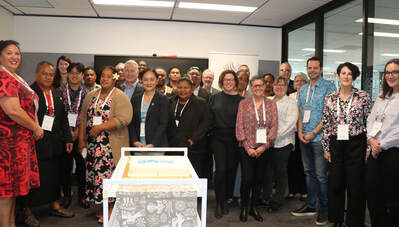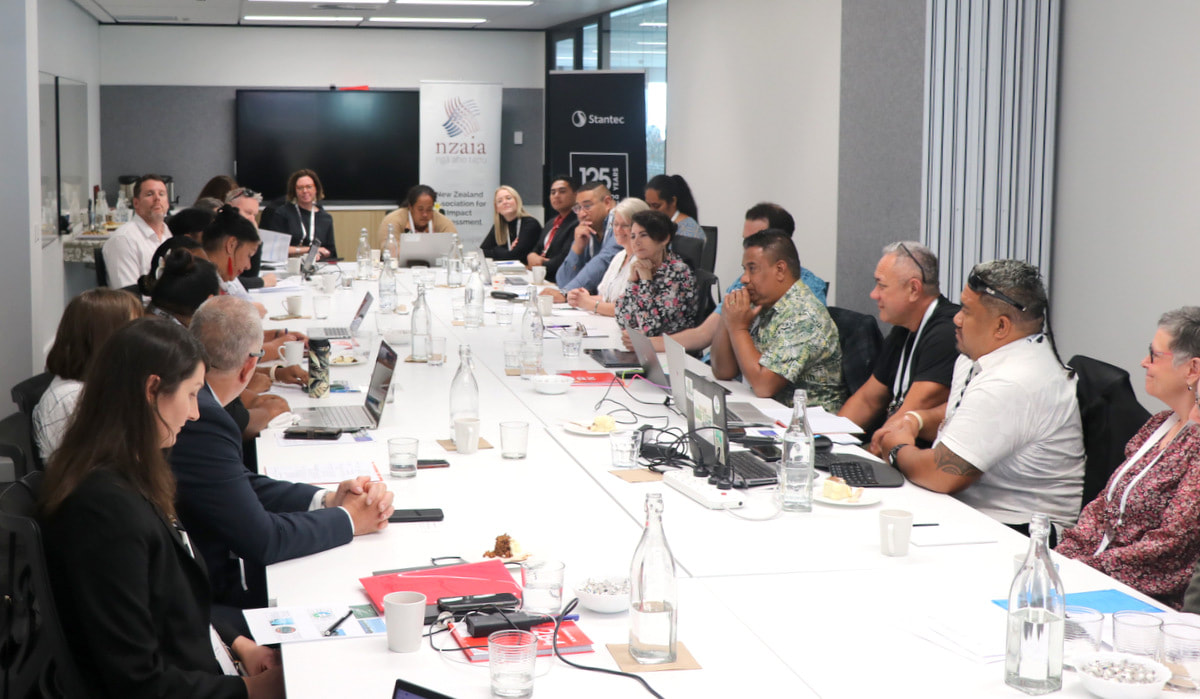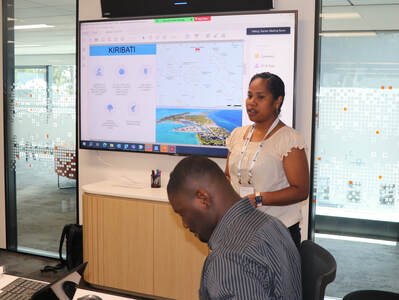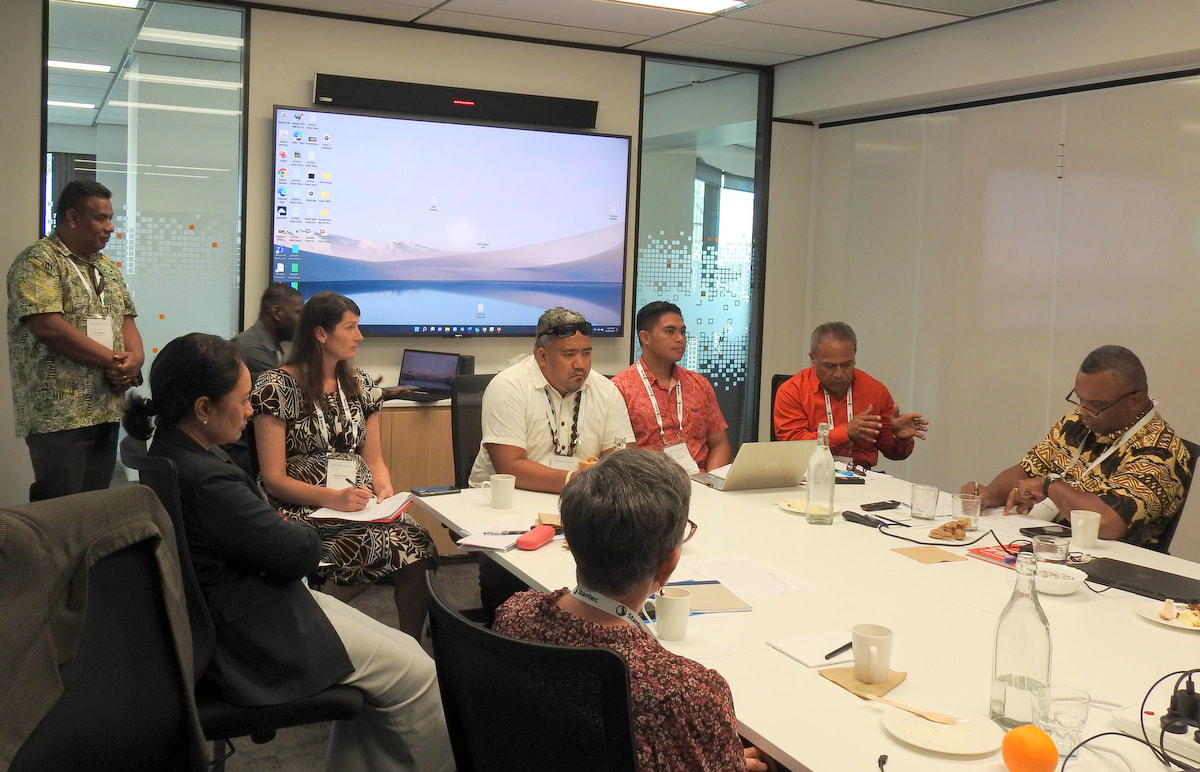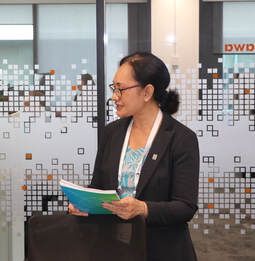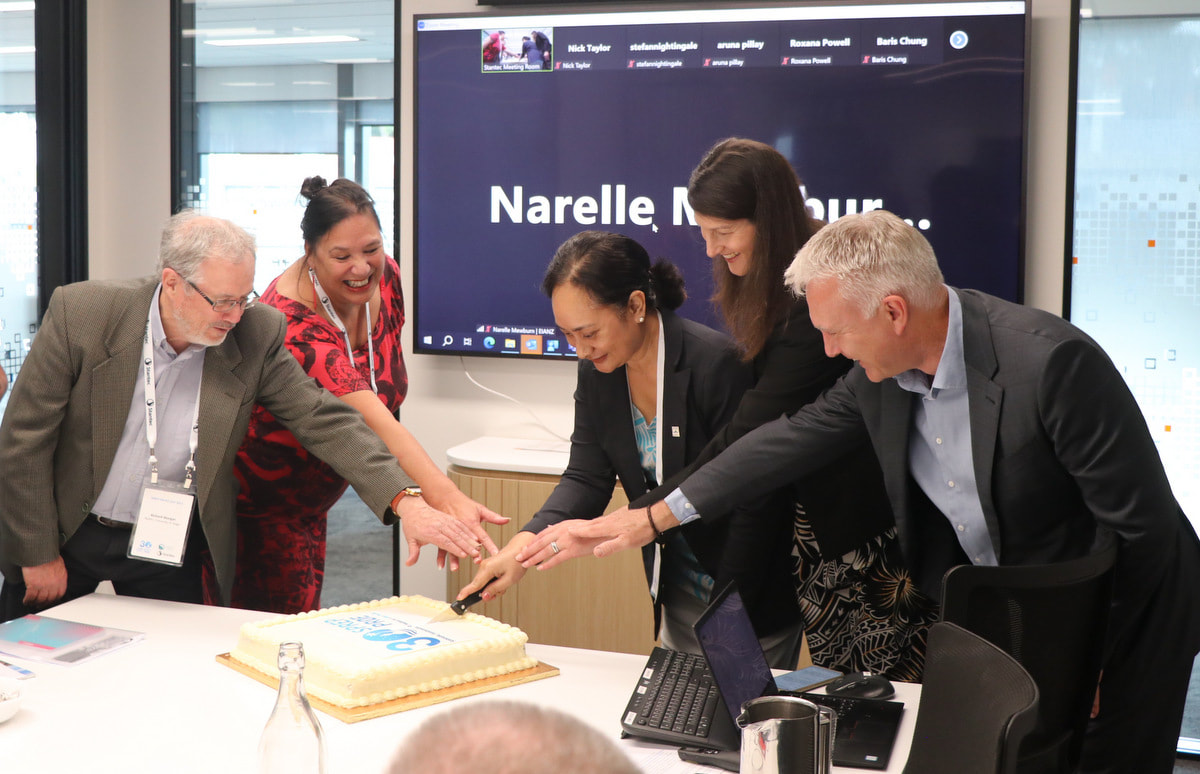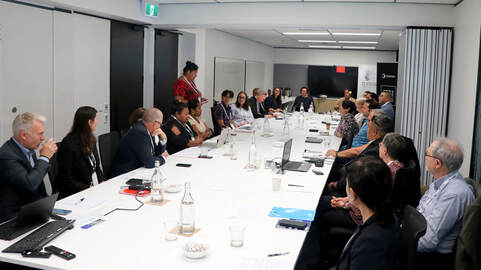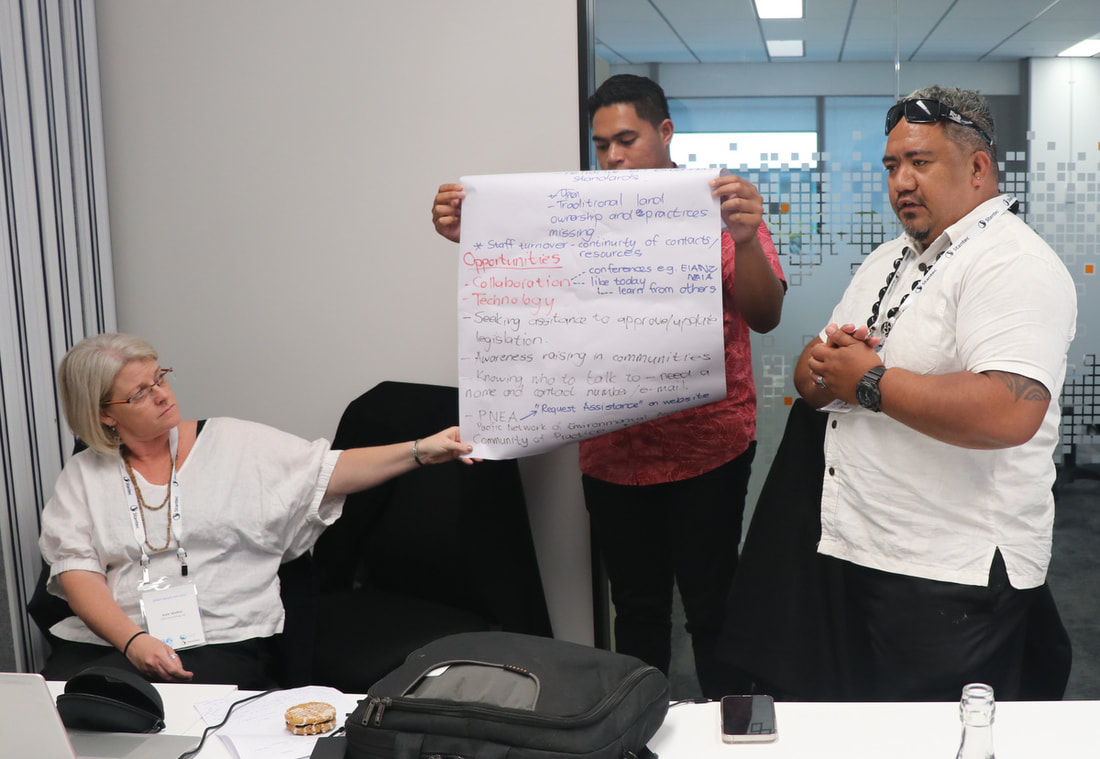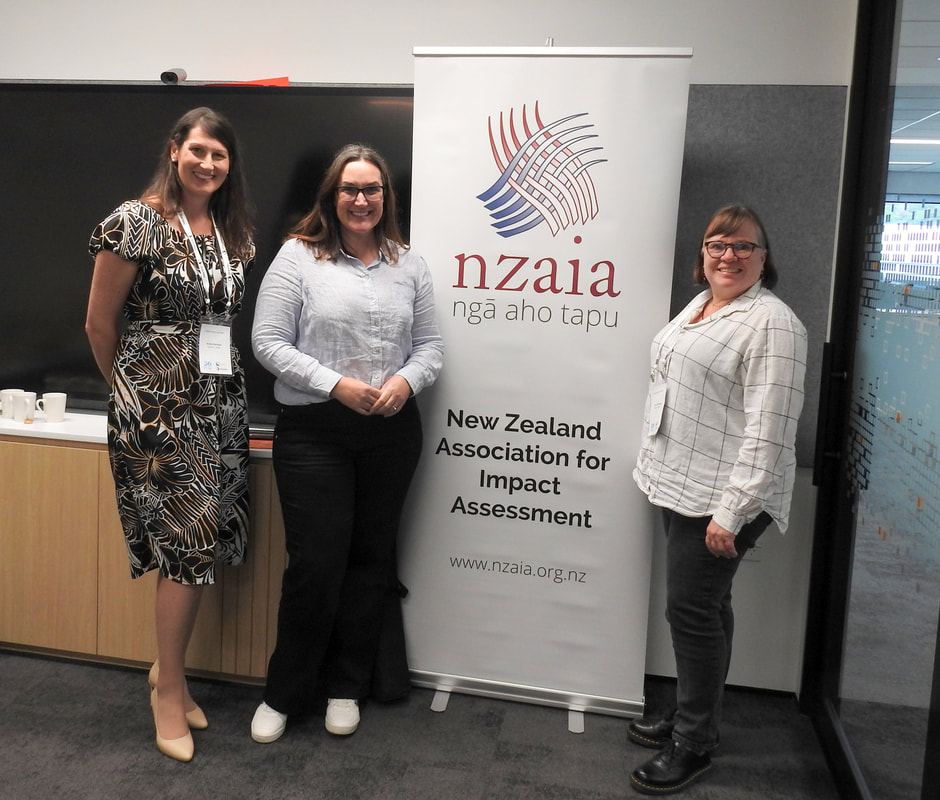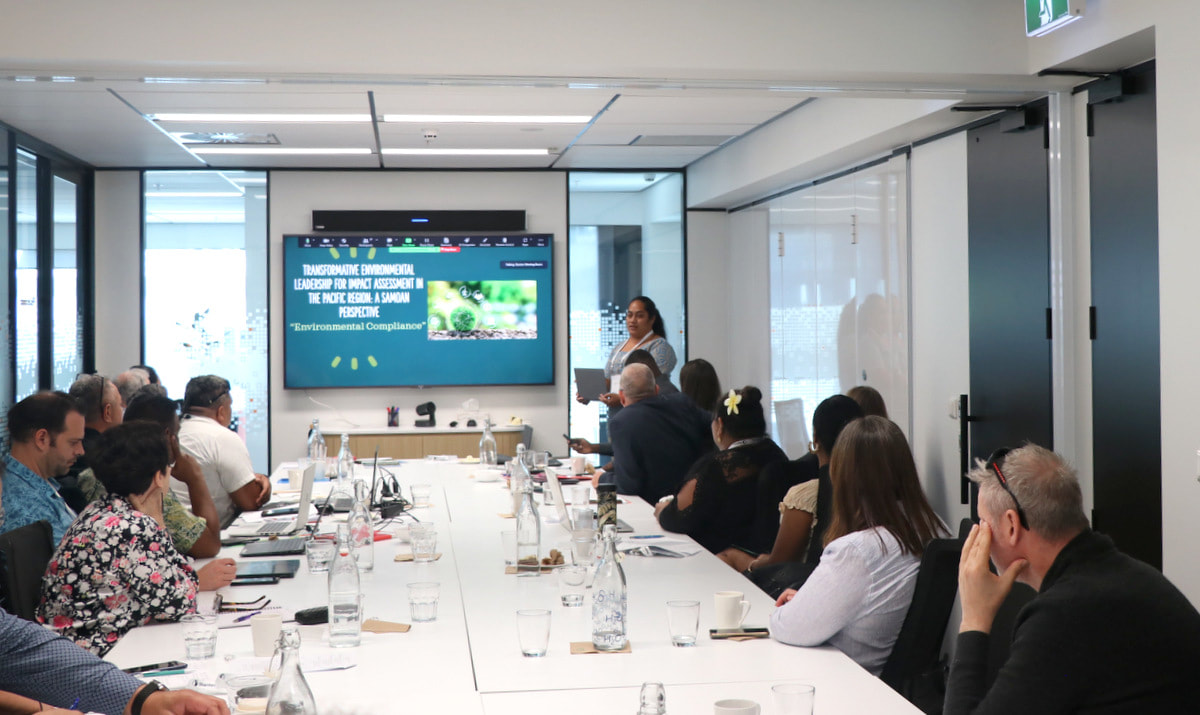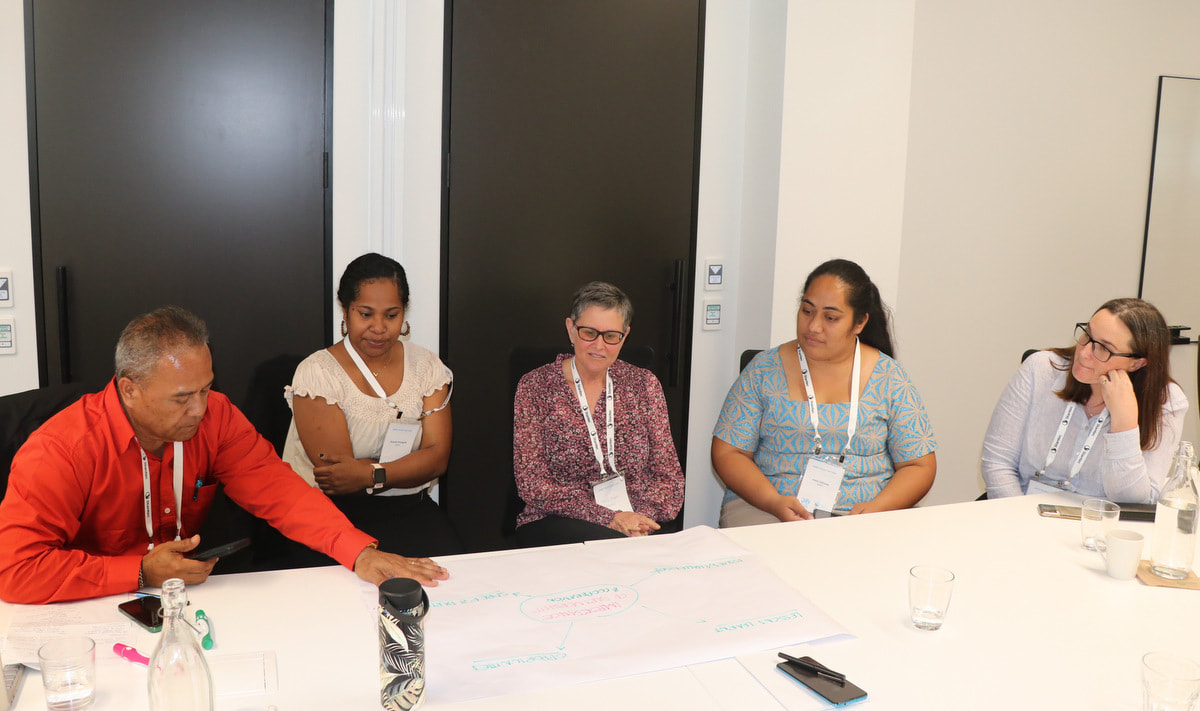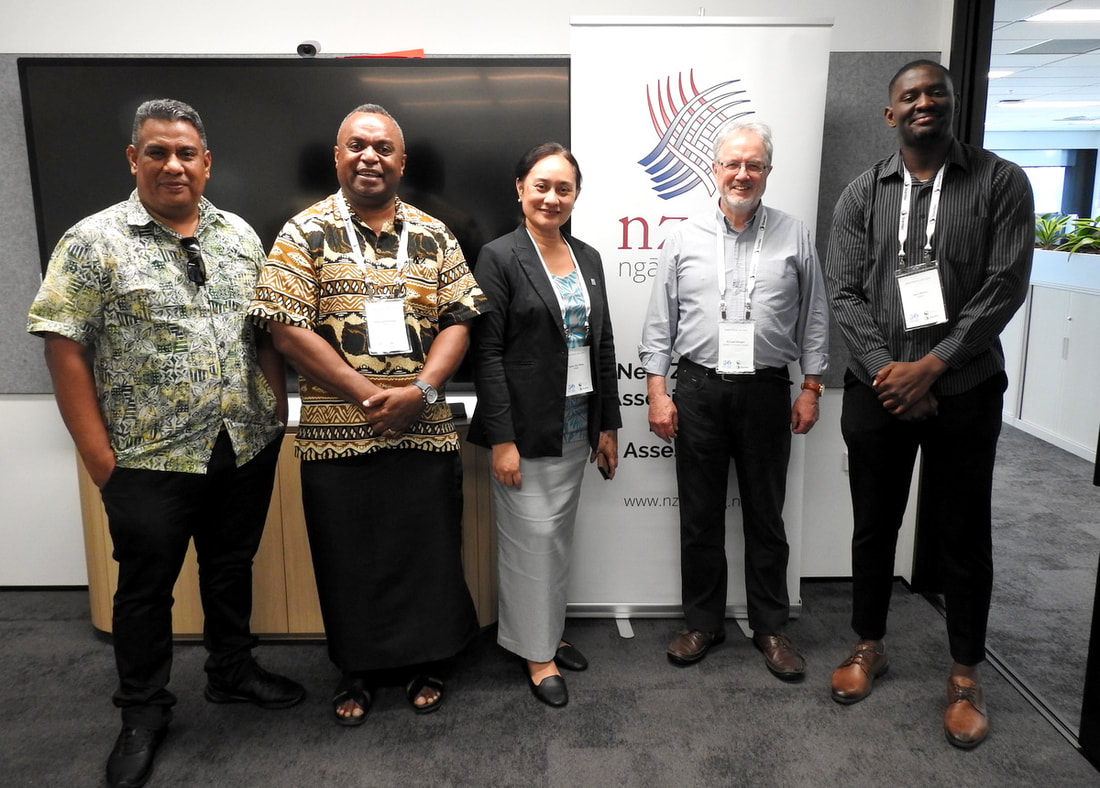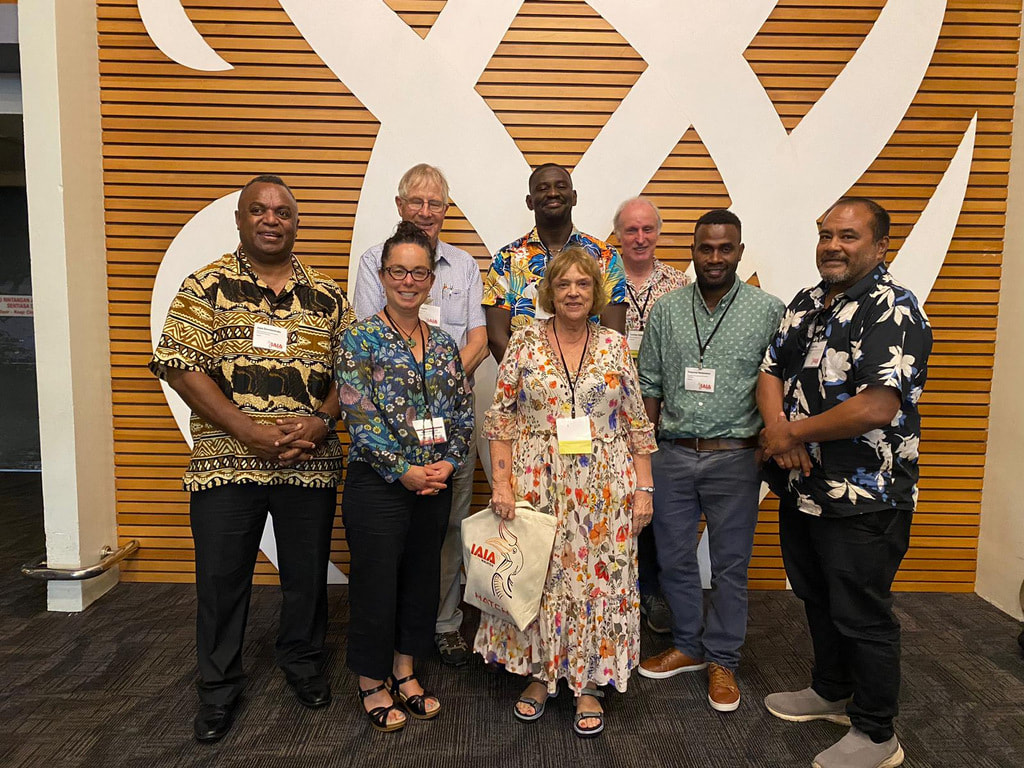News
EIANZ conference 17-19 Oct, Auckland
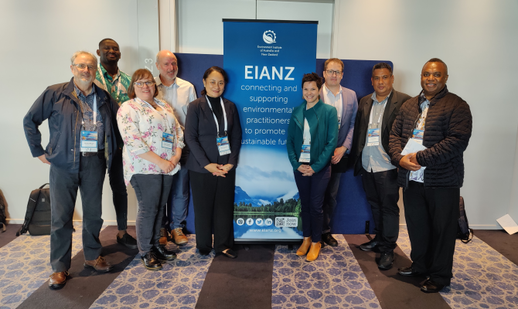
Building relationships....
From left:
Richard Morgan (Acting Chair, NZAIA); Ivan Diarra (SPREP PNEA Technical Support Officer); Terry Calmeyer (NZAIA Core Group) Lachie Wilkinson (Co-ordinator, SIS-IA); Easter Chu Shing (SPREP Deputy Director-General); Vicki Brady (President, EIANZ); Jonathon Miller (CE, EIANZ); Puta Tofinga (SPREP Environmental Assessment & Planning Officer); Jope Davetanivalu (SPREP Director Environmental Monitoring & Governance).
(photo: Ivan Diarra)
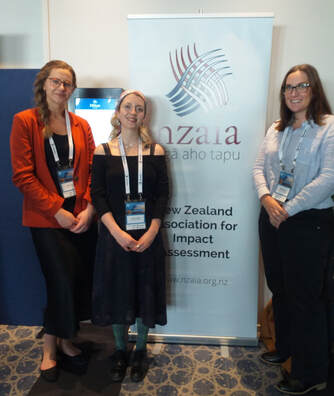
NZAIA postgraduate conference scholarship recipients 2023
From left:
Jess Farrar (Lincoln Univ.), Larissa Hinds (Univ. Otago), Milly Woods (Univ. Canterbury)
(photo: Terry Calmeyer)
Click here to read reflections on the conference from Milly, Larissa and Jess
Pacific Day, 16 October 2023
Here are some photos from the pre-EIANZ conference event held at Stantec Auckland offices. (Thanks to Ivan Diarra, SPREP for photos)
Here are some photos from the pre-EIANZ conference event held at Stantec Auckland offices. (Thanks to Ivan Diarra, SPREP for photos)
Introduction to EIANZ's Special Interest Section - Impact Assessment (SIS-IA) 4 August 2023
Special Interest Sections in EIANZ are Institute-wide groups that bring together members with a shared area of interest. The Impact Assessment Special Interest Section (SIS-IA) was set up to achieve good environmental outcomes by:
The SIS-IA has established communities of practice including social impact assessment, strategic environmental assessment and organised reasoning. These provide an opportunity for anyone with an interest in these areas to get together, share experiences and promote good practice.
The SIS-IA holds an annual Impact Assessment Symposium and regularly runs other events such as webinars, sessions and workshops at EIANZ conferences and training courses.
More information on the SIS-IA is available at https://www.eianz.org/about/impact-assessment/ia-section. You can also join the Linked-In group at www.linkedin.com/groups/6970261/.
Lachlan Wilkinson, SIS-IA co-ordinator
Special Interest Sections in EIANZ are Institute-wide groups that bring together members with a shared area of interest. The Impact Assessment Special Interest Section (SIS-IA) was set up to achieve good environmental outcomes by:
- Promoting ethical and competent practice of impact assessment by environmental practitioners through developing tools, competencies and a certification process
- Developing and promoting, within the wider community, practices to support and extend impact assessment through institutional and decision-making frameworks, processes, standards, competencies and tools.
The SIS-IA has established communities of practice including social impact assessment, strategic environmental assessment and organised reasoning. These provide an opportunity for anyone with an interest in these areas to get together, share experiences and promote good practice.
The SIS-IA holds an annual Impact Assessment Symposium and regularly runs other events such as webinars, sessions and workshops at EIANZ conferences and training courses.
More information on the SIS-IA is available at https://www.eianz.org/about/impact-assessment/ia-section. You can also join the Linked-In group at www.linkedin.com/groups/6970261/.
Lachlan Wilkinson, SIS-IA co-ordinator
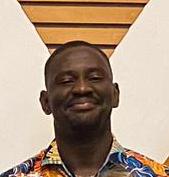
Introducing the Pacific Network for Environmental Assessment (PNEA) 2 July 2023
Ivan Diarra, PNEA technical Support Officer, SPREP
The Pacific Network for Environmental Assessment (PNEA) is a Pacific-led initiative that aims to enhance environmental assessment practices in the region. Led by the Secretariat of the Pacific Regional Environment Programme (SPREP), the PNEA serves as a vibrant community of practice for Environmental Impact Assessment (EIA), Strategic Environmental Assessment (SEA), and Environmental and Social Sustainability (ESS) practitioners.
The PNEA connects practitioners, fostering collaboration, knowledge sharing, and professional development. This online platform provides a wealth of resources, updates, and exclusive training opportunities tailored to the Pacific context. Through the PNEA, practitioners gain access to a supportive network that empowers them to enhance their skills, stay informed, and contribute to sustainable development in the Pacific.
The PNEA's resource hub is a repository of tailored materials for the Pacific, including guidelines, best practices, case studies, reports, and publications, supporting decision-making processes. The portal also hosts webinars and training modules under the Pacific Learning Partnership (PLP), a collaborative effort involving SPREP, the World Bank, Asian Development Bank, and the University of the South Pacific. These regional webinars focus on Environmental and Social Sustainability (ESS) and address the expressed needs of practitioners in the Pacific. Led by industry experts, these engaging webinars cover a wide range of environmental assessment and sustainability topics, providing valuable insights, practical tools, and case studies tailored to the Pacific's unique challenges and opportunities.
The PNEA actively engages in partnerships and collaborations with other communities of practice and networks, including the New Zealand Association for Impact Assessment (NZAIA) and the Environment Institute of Australia and New Zealand (EIANZ). These partnerships provide opportunities for knowledge exchange, shared expertise, and support between the Pacific and wider environment practitioners across Oceania.
By engaging with the PNEA, NZAIA members can strengthen their understanding of environmental assessment practices in the Pacific and explore opportunities for collaboration.
To access the PNEA portal and learn more, please visit the PNEA Portal. For further inquiries, you can reach out to the PNEA team at SPREP via email: [email protected].
|
6 June 2023
Nick and Cilla Taylor, and Dy Jolly attended the IAIA conference in Kuching in May. They took the opportunity to meet with SPREP and EIANZ (SIS-IA) colleagues to discuss the EIANZ conference in Auckland later this year. See Nick and Cilla's report on the conference below From left: Jope Davetanivalu (Director, Environmental Monitoring and Governance, SPREP); Dy Jolly (Lincoln University); Nick Taylor; Cilla Taylor (front); Ivan Diarra (Technical support officer, PNEA, SPREP); Lachie Wilkinson (SIS-IA co-ordinator, EIANZ); Osborne Melenamu, (Vanuatu Department of Environmental Protection and Conservation); Bryan Star (Director, Nauru Department of Commerce, Industry and Environment). |
IAIA’23 Conference report
Nick and Cilla Taylor
Nick and Cilla Taylor
The IAIA annual conference was an in-person event held at the Borneo Convention Centre Kuching , in Kuching, Sarawak, Malaysia from 8-11 May 2023 and the conference attracted more than 600 attendees from around the globe.
The conference centre is spacious, allowing the organisers to hold the conference on one level, facilitating movement between sessions and casual interaction, which, along with good food, attentive staff and the excellent IAIA HQ, all helped with smooth running of the event. Everyone clearly relished the post-covid opportunity to meet in person.
The conference theme focused on building resilience of ecosystems and human communities through good practice of impact assessment combined with effective leadership, both to lead and conduct impact assessments and also to use them effectively in decision making and implementing change.
The keynote speaker Prof. Tan Sri Dr Jemilah Mahmood is Professor and Executive Director of the Sunway Centre for Planetary Health in Malaysia. She provided an excellent opening to the conference themes, emphasising the interlinked consequences of policy making and decisions, with her particular emphasis on the need to consider health impacts.
We enjoyed the Indigenous people’s sessions, which featured inputs from Canada, Aotearoa, Australia, Africa and Asia including Malaysia. Sadly there were observations about ongoing violations of the reasonable expectations of remote and traditional communities to be provided with all the results of ESIAs so they can participate fully in planning sustainable uses of their land, forests and rivers. Discussions showed wide agreement amongst participants that participatory impact assessment is fundamental to achieving Free, Prior and Informed Consent (FPIC) in affected communities.
Speakers emphasised the importance of indigenous-led impact assessments in order to build resilient communities. Jettie Word of the Borneo Project provided an overview of the work of indigenous communities in Sarawak who are “decolononising” impact assessments by collecting baseline social and ecological data incorporating indigenous knowledge. They funded and trained local researchers to study the values of the remaining natural forests and empower affected peoples. Celine Lim from Save Rivers articulated the importance of impact assessment as an essential part of FPIC. Save Rivers empowers Sarawak rural communities to protect their rivers and forests through capacity building, research and advocacy.
It was heartening to hear about the activities of the Malaysian Association of Social Impact Assessment from their president TPr Herlina Ab Aziz. The Association is working to build capacity and competent practice of SIA in Malaysia. There is a clear focus in Malaysia on strategic assessment of the impacts of town and country planning as well as SIA of development projects. The Association organises capacity building through skills workshops and webinars. With many shared objectives to NZAIA there is potential for us to collaborate with them in achieving our respective visions.
We provided a poster for the Affiliates section of the conference poster session and this highlighted the multiple activities that NZAIA undertakes with and for our members. The Portugal poster also stood out as an affiliate with similar activities to ours. In addition we had the opportunity to meet in person with representatives of our formal partners at SPREP and EIANZ (see our MOUs) to discuss mutual support and future activities including the EIANZ 2023 conference in Auckland in October.
Kuching is a diverse, dynamic city with the main bazaar area at its heart, alongside a people-focused waterfront along the Sarawak River. This centre retains old-style shop houses with businesses ranging from tourist-focused craft shops that feature along the waterfront to local food outlets, excellent coffee, fresh pepper sales (with aromas), cloths, chain saws, car parts and light manufacturing such as baking tins up side and back streets,. There is also the outstanding new Borneo Cultures Museum, plus a foot tour of the old museum now fully restored and ready for additional exhibits on natural and cultural heritage. In contrast to the centre of Kuching is the urban sprawl typical of much of SE Asia (and NZ), with medium-rise housing, malls, roads clogged at peak hours and calls to build MRT.
There are a number of small national parks and conservation areas close to the city, accessible by car and boat. Sarawak is an easy and highly rewarding place to visit for New Zealanders with interests in cultures and ecology. We enjoyed a visit to Bako National Park, with monkeys around Park HQ and a boat trip to view the rock stacks; and another day the sunset on a beach at Santubong National Park, with a seafood meal afterwards nearby at a fishing village, with old and new friends.
31 May 2023
The conference centre is spacious, allowing the organisers to hold the conference on one level, facilitating movement between sessions and casual interaction, which, along with good food, attentive staff and the excellent IAIA HQ, all helped with smooth running of the event. Everyone clearly relished the post-covid opportunity to meet in person.
The conference theme focused on building resilience of ecosystems and human communities through good practice of impact assessment combined with effective leadership, both to lead and conduct impact assessments and also to use them effectively in decision making and implementing change.
The keynote speaker Prof. Tan Sri Dr Jemilah Mahmood is Professor and Executive Director of the Sunway Centre for Planetary Health in Malaysia. She provided an excellent opening to the conference themes, emphasising the interlinked consequences of policy making and decisions, with her particular emphasis on the need to consider health impacts.
We enjoyed the Indigenous people’s sessions, which featured inputs from Canada, Aotearoa, Australia, Africa and Asia including Malaysia. Sadly there were observations about ongoing violations of the reasonable expectations of remote and traditional communities to be provided with all the results of ESIAs so they can participate fully in planning sustainable uses of their land, forests and rivers. Discussions showed wide agreement amongst participants that participatory impact assessment is fundamental to achieving Free, Prior and Informed Consent (FPIC) in affected communities.
Speakers emphasised the importance of indigenous-led impact assessments in order to build resilient communities. Jettie Word of the Borneo Project provided an overview of the work of indigenous communities in Sarawak who are “decolononising” impact assessments by collecting baseline social and ecological data incorporating indigenous knowledge. They funded and trained local researchers to study the values of the remaining natural forests and empower affected peoples. Celine Lim from Save Rivers articulated the importance of impact assessment as an essential part of FPIC. Save Rivers empowers Sarawak rural communities to protect their rivers and forests through capacity building, research and advocacy.
It was heartening to hear about the activities of the Malaysian Association of Social Impact Assessment from their president TPr Herlina Ab Aziz. The Association is working to build capacity and competent practice of SIA in Malaysia. There is a clear focus in Malaysia on strategic assessment of the impacts of town and country planning as well as SIA of development projects. The Association organises capacity building through skills workshops and webinars. With many shared objectives to NZAIA there is potential for us to collaborate with them in achieving our respective visions.
We provided a poster for the Affiliates section of the conference poster session and this highlighted the multiple activities that NZAIA undertakes with and for our members. The Portugal poster also stood out as an affiliate with similar activities to ours. In addition we had the opportunity to meet in person with representatives of our formal partners at SPREP and EIANZ (see our MOUs) to discuss mutual support and future activities including the EIANZ 2023 conference in Auckland in October.
Kuching is a diverse, dynamic city with the main bazaar area at its heart, alongside a people-focused waterfront along the Sarawak River. This centre retains old-style shop houses with businesses ranging from tourist-focused craft shops that feature along the waterfront to local food outlets, excellent coffee, fresh pepper sales (with aromas), cloths, chain saws, car parts and light manufacturing such as baking tins up side and back streets,. There is also the outstanding new Borneo Cultures Museum, plus a foot tour of the old museum now fully restored and ready for additional exhibits on natural and cultural heritage. In contrast to the centre of Kuching is the urban sprawl typical of much of SE Asia (and NZ), with medium-rise housing, malls, roads clogged at peak hours and calls to build MRT.
There are a number of small national parks and conservation areas close to the city, accessible by car and boat. Sarawak is an easy and highly rewarding place to visit for New Zealanders with interests in cultures and ecology. We enjoyed a visit to Bako National Park, with monkeys around Park HQ and a boat trip to view the rock stacks; and another day the sunset on a beach at Santubong National Park, with a seafood meal afterwards nearby at a fishing village, with old and new friends.
31 May 2023
